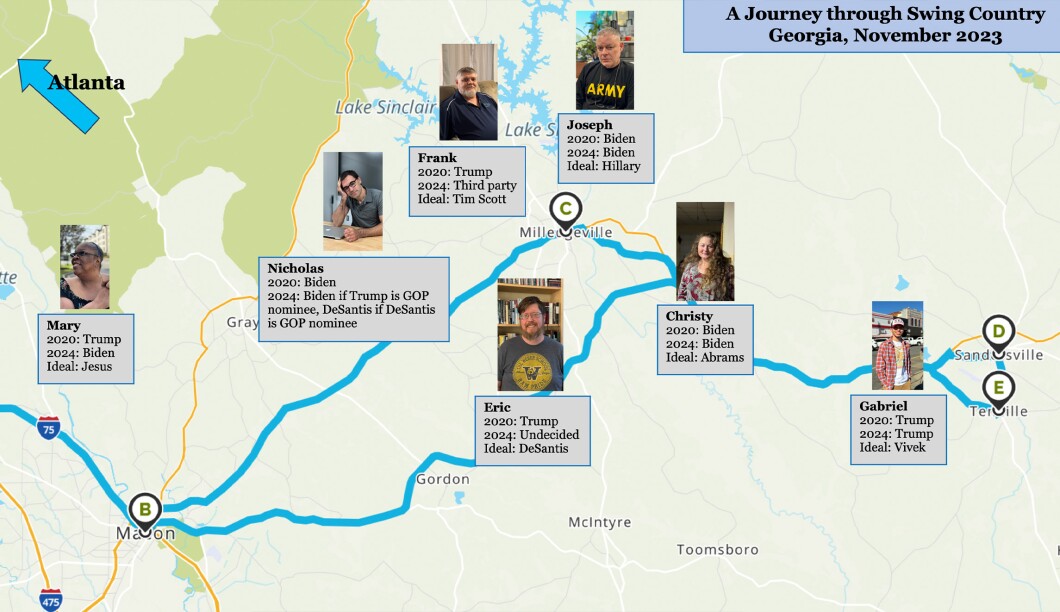
MILLEDGEVILLE, Georgia — Eric voted for Donald Trump in the last election. He really, really does not want Trump to be president again.
A professor at the local college, Eric sat with me on the sofa of his breezy detached home in the central Georgia city of Milledgeville, northeast of Macon. His shelves are stacked with a colorful mix of fantasy fiction and science books. His wife sits nearby, tapping away at a laptop. His 7-year-old daughter, dressed in a giraffe onesie, occasionally interjects (“Who did Pa say is corrupt, Mom?” “Hillary”).
BIDEN-XI MEETING HAS REPERCUSSIONS AT HOME AHEAD OF ELECTION: ‘THE US HAS ENOUGH ON ITS PLATE’
“Losing the election has broken something in Trump,” Eric said. “He turns on everybody who he thinks is any sort of threat. It’s all just about him wanting to get back in office and him wanting to destroy anyone who threatened to keep him from getting back in office.”
Telling me how he identifies as a conservative and attends a traditional church, Eric becomes more animated: “I find it hard to believe he would go in there and be as strongly fighting for more conservative ideas. … He doesn’t seem to care at all about the well-being of the country anymore.”
Eric is flummoxed, and depressed, that Trump looks set to be the nominee over what should be serious 2024 Republican primary rivals like Gov. Ron DeSantis (R-FL), former South Carolina Gov. Nikki Haley, and others.

Eric is not alone in resenting the choice he likely faces this time next year. Just under 1 in 6 voters across the country say they want neither President Joe Biden nor Trump in the White House: That’s 23 million people. To find out more about these “Double Disapprovers,” I have spent a week journeying through Georgia’s swing country.
The Peach State has emerged as a key political battleground in presidential and statewide elections. The onetime Republican stronghold backed Biden over Trump in 2020 by 49.47% to 49.24%, the first time it has supported a Democratic presidential nominee since Bill Clinton in 1992. Two months later, now-Sens. Jon Ossoff (D-GA) and Raphael Warnock (D-GA) won Senate special elections against GOP incumbents, giving Senate Democrats their first majority in six years. Democrats have also eaten into Republicans’ once-dominant edge in the House delegation the state sends to Washington.
Still, Gov. Brian Kemp (R-GA) in 2022 easily won reelection. In fact, all statewide offices are held by Republicans. And both chambers of the state legislature are GOP-controlled.
Georgia’s newfound political competitiveness is fueled by shifting demographics, which, per the 2022 census figures, is about 50.4% non-Hispanic white and 33.1% black. That is alongside a fast-rising Latino community, at 10.5%, with the growing Asian American population at 4.8%.
The population churn is due, in part, to large employers increasingly landing top recruits for professional-class jobs. Many of these new Georgians bring with them distinctly nonconservative politics as they fill executive and management roles in companies and government agencies, from the Centers for Disease Control and Prevention to the Coca-Cola Company.
Terrified of Trump
My journey starts about two hours’ drive from Atlanta. To learn more about the Double Disapprovers, I set off to undertake a series of in-depth interviews in two neighboring counties that voted Biden for president in 2020 but Kemp for governor in 2022.
Washington and Baldwin counties are a mix of antebellum towns and deep forests. They are a blend of cosmopolitanism (there are more rainbow flags than I expected) and conservatism (yes, this Brit got to shoot a big gun on a ranch). They are studded with Native American burial mounds and on the route of Sherman’s infamous “March to the Sea.” In the last election, they voted narrowly for Biden.
Nothing makes the people of these counties any more inherently volatile than anywhere else; their swinginess comes from contrasts too. Both counties are close to 50-50 white and black, and the largest city of Milledgeville is a quintessential college town drawing from affluent families in the middle of a deep-red countryside. Its divisions mean it is no paradise: Joseph, a Nighthawks veteran who now works at a veterans home, tells me he has been to five children’s funerals related to gun crime in the last three years. Its median income is only around $23,000.
Trump’s reaction to the 2020 election has put some of the Double Disapprovers of these counties off for good. Take Mary, an African American grandma of 10. Draped in a bright scarf, she has a deep Southern accent and since our meeting has practically taken me on as her 11th grandchild; she now messages me wholesome “Good morning” GIFs every day. Mary voted for Trump in 2020 and has been horrified ever since.
“Trump makes people crazy. What he did on the Capitol should be unforgivable because people lost their lives, families loved ones, for a bunch of rednecks with no sense.” She is now leaning toward the “too caring, old but stable” Biden.
Frank, a sagely bearded teacher with a voting history that ranges from Reagan to Ross Perot to a write-in candidate he can’t remember, could accompany the definition of “independent” in the dictionary. He backed Trump in 2020 but now is set to vote third party because of the “divisiveness” the former president brings with him.
Nicholas, who voted for Sen. David Perdue in the Republican’s Senate runoff against Democratic rival Ossoff, says a Trump second term would be one of impeachments, social strife, an emboldened Putin, and bitter revenge. Christy, a state employee, sums it up most succinctly: “He’s the only president I’ve ever seen go into office, then come out of it looking exactly the same. He didn’t age at all. What was he doing in there? Not a damn thing.”
Bearish on Biden
But Biden is losing support in Georgia too, even from traditional Democrats. In the veterans home, Joseph points to a picture of former Presidents Barack Obama and Clinton on his office wall: “Biden’s not like them. If he even had just a portion of their attitude and character, I would be more on board.”
Most Democrats I spoke to admitted they had become more apathetic about and less engaged in politics in the last three years. This might be the sharpest irony about Trump’s defeat: A less fervent political atmosphere in Trump’s absence since 2020 has created a complacency among his opponents that may dent their turnout in 2024.
Among the independents turned off by Trump, Biden has squandered an opportunity to reach out. Nicholas, a graduate student at the college, voted Biden in 2020 to restore “civility” but feels bitterly let down: “He declared that he ran as a Democrat but he’s going to be an American president. But he’s been very, very … it’s sad to say, but he’s been very polarizing. He did not unite the country at all.”
Others expected Biden to reach across the aisle but have only seen him condone court cases against Trump, inflame divisions over the COVID-19 vaccine, and sit quietly while states attempt to take the former president off the ballot. The picture-perfect independent, Frank, said he would vote for other Democrats against Trump but not a weak Biden who has “taken all the wrong lessons from the last few years.” Listening to these voters, it is easy to see how Democrats may have sown the seeds of their own defeat.
‘They’re waking up’
After a few days, I leave Milledgeville and head down the road to Washington County. Having sent the largest contingency of Confederate soldiers than anywhere else in the state, the county still bears the scars of the Civil War. In the town square of Sandersville, you can still see the bullet holes.
It is in the railway town of Tennille, also sacked by Sherman and with a population of 1,500, that I meet Gabriel. Biracial, born to a black father (now in prison) and a white mother (now a drug addict), he grew up with his African American grandmother. Twenty-three years old, he sits me down in a coffee shop. He’s cool: red cap, trendy shirt, chain around his neck. He should also strike fear into Joe Biden.
He sips a water and leans forward: “The African American community … they’re waking up. Even on TikTok or Facebook, it used to be like, ‘Oh, you’ll become Uncle Tom,’ ‘You’ll become white’ if you vote Republican. But people are now seeing that Democrat ways don’t help and that Donald Trump actually did more to help them out than what the Democrats claim to do.”
There used to be a slave market on the main square here. The one black steward from the Governor’s Mansion would walk around in a dandy blue jacket and white trousers to avoid being abused or rounded up. Decades later, it is African Americans who hold the president’s future in their hands. Even if Biden holds everyone else who voted for him in 2020, a small decline in turnout could cost him the presidency.
One analyst, Ryan Girdusky, tells me it would only take a 1% change in black turnout to do so. No one I spoke to thought African Americans would vote in anything like the same numbers as before. Last November, even the popular Stacey Abrams could not get a sizable portion of African American voters to the ballot box in her campaign for governor.
I asked Gabriel whether it would affect the next election. “Not as much as it should. Not as much as it can. But, like, I know they’re not going to have 88% of the African American vote next time.” Why are nonwhites turning against Biden? “It’s people doing the extreme stuff … on the Left,” he answers. Whether on trans issues, welfare (“You can’t reward someone for not doing the right thing”), or support for the nuclear family (“I learnt that from my own experience”), the Democrats do not stand for them anymore. “I think the Democrats are OK with trading that off for [white] women, to have all the women votes instead.”
When Gabriel starts talking about the military-industrial complex and the World Economic Forum being in charge, I flinch. But the more I listen to him, it becomes clear he is the rational one. In Gabriel’s eyes, Trump might be an “asshole” but is so excessively maligned by the media and Biden so excessively supported that something must be going on. “Their hate is strong. And somehow, stuff with Wisconsin, then Connecticut, Colorado, somehow they might get Trump pulled off the ballot. Yeah … I don’t know if it’s they want Biden or they don’t want Donald Trump in office. Or they don’t want him specifically because he’s spoken out, that Trump has tried to figure out what they’re doing. It sounds crazy.”
He pauses, shaking his head at the fact he is saying it, “But you have to follow the most logical conclusion, like the path of least resistance. Like, they don’t want fair elections. There’s got to be something bigger, something bigger than Joe Biden and whoever.”
We walk outside into the Georgia sun. Gabriel won’t take his hat off for a picture (“I have curly hair, man. Ain’t no way”), but he leaves me with one more thought. “We need more love, less anger. This country is almost like a movie. I hope that it sorts itself out.”
CLICK HERE TO READ MORE FROM THE WASHINGTON EXAMINER
Back in Milledgeville, Frank agrees: He wants a uniter, a “Christmas truce” for America. In the veterans home, Joseph is sick of a world in which his sister does not speak to him because of his politics. The Double Disapprovers yearn for a world without the drama of Trump and Biden. Maybe they will get their wish: This movie has some way to run. But the unpalatable choice of Trump or Biden is the most likely outcome.
Trump’s reputation is severely damaged. Really anyone should be able to beat him. But back in Eric’s living room, amid a growingly restless daughter in a giraffe onesie, there is only one choice in that world of two evils. Despite everything bad he has to say about Trump, he is resolute: Trump would get his vote against Biden. “It’s definitely negative with Biden versus maybe negative with Trump.” It is that sentiment, along with a dismantling nonwhite vote and a disengaged Democratic base, that makes Georgia’s swing counties, for now, Donald Trump’s to lose.
James Johnson was formerly the chief pollster at 10 Downing St. in the United Kingdom for the prime minister. He now runs J.L. Partners USA, a public opinion research and strategy firm.
Interviews for the piece were conducted according to market research guidelines and recruited from a randomly modeled universe from the voter file in Baldwin and Washington counties in Georgia.





